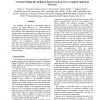Free Online Productivity Tools
i2Speak
i2Symbol
i2OCR
iTex2Img
iWeb2Print
iWeb2Shot
i2Type
iPdf2Split
iPdf2Merge
i2Bopomofo
i2Arabic
i2Style
i2Image
i2PDF
iLatex2Rtf
Sci2ools
106
click to vote
ICCV
2007
IEEE
2007
IEEE
Cortical Folding Development Study based on Over-Complete Spherical Wavelets
We introduce the use of over-complete spherical wavelets for shape analysis of 2D closed surfaces. Bi-orthogonal spherical wavelets have been shown to be powerful tools in the segmentation and shape analysis of 2D closed surfaces, but unfortunately they suffer from aliasing problems and are therefore not invariant under rotations of the underlying surface parameterization. In this paper, we demonstrate the theoretical advantage of over-complete wavelets over bi-orthogonal wavelets and illustrate their utility on both synthetic and real data. In particular, we show that over-complete spherical wavelets allow us to build more stable cortical folding development models, and detect a wider array of regions of folding development in a newborn dataset.
Bi-orthogonal Spherical Wavelets | Computer Vision | ICCV 2007 | Over-complete Spherical Wavelets | Spherical Wavelets |
| Added | 03 Jun 2010 |
| Updated | 03 Jun 2010 |
| Type | Conference |
| Year | 2007 |
| Where | ICCV |
| Authors | Peng Yu, B. T. Thomas Yeo, P. Ellen Grant, Bruce Fischl, Polina Golland |
Comments (0)

